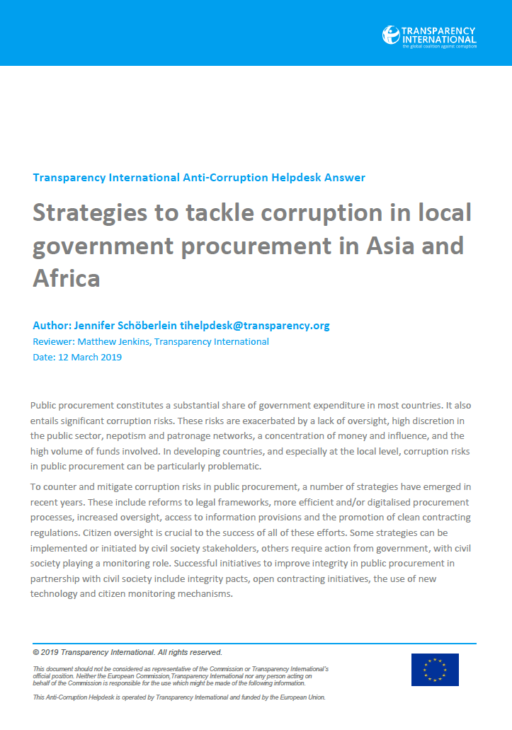- Home
- Anti-Corruption Helpdesk
- Strategies to tackle corruption in local government procurement in Asia and Africa
Strategies to tackle corruption in local government procurement in Asia and Africa

This Anti-Corruption Helpdesk brief was produced in response to a query from one of Transparency International’s national chapters. The Anti-Corruption Helpdesk is operated by Transparency International and funded by the European Union.
Query
Please provide a mapping of anti-corruption activities in local level public procurement. Where possible, these should involve civil society in some capacity and focus on examples from sub-Saharan Africa and Asia.
Summary
Public procurement constitutes a substantial share of government expenditure in most countries. It also entails significant corruption risks. These risks are exacerbated by a lack of oversight, high discretion in the public sector, nepotism and patronage networks, a concentration of money and influence, and the high volume of funds involved. In developing countries, and especially at the local level, corruption risks in public procurement can be particularly problematic.
To counter and mitigate corruption risks in public procurement, a number of strategies have emerged in recent years. These include reforms to legal frameworks, more efficient and/or digitalised procurement processes, increased oversight, access to information provisions and the promotion of clean contracting regulations. Citizen oversight is crucial to the success of all of these efforts. Some strategies can be implemented or initiated by civil society stakeholders, others require action from government, with civil society playing a monitoring role. Successful initiatives to improve integrity in public procurement in partnership with civil society include integrity pacts, open contracting initiatives, the use of new technology and citizen monitoring mechanisms.
Contents
- Corruption in public procurement
- Strategies to tackle corruption in (local) government procurement
- Integrity pacts
- Open contracting initiatives
- Use of technological solutions
- Other forms of citizen oversight
- References
Main points
To increase integrity and accountability in procurement, independent monitoring and oversight mechanisms are crucial.
Civil society participation is paramount to ensure anti-corruption strategies lead to greater accountability.
Recent developments in open contracting and the use of new technologies are promising developments to counter corruption at the local level.
Access to information provisions, capacity building for public sector and civil society, and a user-friendly processing of data are needed to ensure civil society is able to successfully contribute to anti-corruption efforts.
Caveats
Best practice examples focusing exclusively on local government procurement are scarce. In this Helpdesk Answer, examples were chosen that either operate primarily at a local level, operate nationally but include a strong element of local ownership or could be adapted to a local level.
Authors
Jennifer Schöberlein [email protected]
Reviewer
Matthew Jenkins, Transparency International
Date
14/03/2019
Tags
 Download PDF
Download PDF
